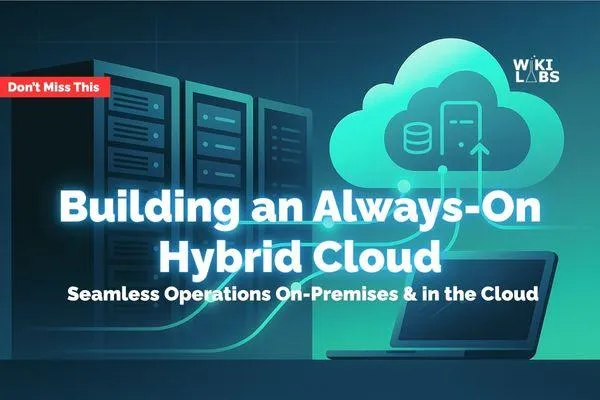
Always-On Hybrid Cloud
Designing High-Availability Hybrid Cloud Infrastructure
Pillar / Category: Hybrid Cloud Infrastructure
Purpose: To outline best practices for architecting, deploying and operating hybrid cloud environments that deliver high availability, performance and cost-efficiency across on-premises and public-cloud resources.

Introduction
Enterprises today need the agility and elasticity of public cloud while retaining control of critical workloads on-premises. Hybrid cloud bridges these worlds—but only if architectures for resilience. This article shares proven strategies to ensure continuous service delivery across your hybrid environment.
Define Your Availability Requirements
Recovery Point Objective (RPO) & Recovery Time Objective (RTO): Map business services to acceptable data loss and downtime.
Tiered Services: Classify applications by criticality—mission-critical, business-supporting, development/test—and assign each its own availability SLA.

Reliable Connectivity & Network Design
Redundant Links: Use multiple dedicated circuits (MPLS/VPN) or dual cloud interconnects to eliminate single points of failure.
Software-Defined WAN (SD-WAN): Dynamically route traffic over the best path based on latency, jitter and packet loss.
Segmentation & QoS: Isolate management, replication and user traffic; prioritise critical flows with quality-of-service policies.
Ready to eliminate single points of failure? Contact us today to architect redundant, high-performance network links.
Custom HTML/CSS/JAVASCRIPT

Secure Hybrid Boundaries
Zero-Trust Network Access (ZTNA): Grant least-privilege, per-application access without exposing the network.
Unified Firewall & Micro-Segmentation: Enforce consistent policies across on-prem and cloud workloads.
Identity & Access Management (IAM): Centralise authentication and authorisation using your corporate directory.

Data Resilience & Workload Placement
Continuous Replication: Stream data between on-prem storage arrays and cloud object storage to meet tight RPOs.
Immutable Backups: Store snapshots in write-once, read-many (WORM) tiers to defend against corruption and ransomware.
Workload Placement: Run latency-sensitive services on local hardware; burst analytics and batch jobs to cloud.
Worried about data loss and latency? Reach out now to implement continuous replication and smart workload placement.

Infrastructure as Code & Automation
Configuration Drift Prevention: Manage both on-prem and cloud resources with the same IaC toolchain (Terraform, Ansible).
Automated Failover Playbooks: Script end-to-end recovery workflows—DNS updates, VM provisioning, network reconfigurations—to eliminate manual errors.
Self-Healing Patterns: Use health probes and auto-scaling groups to automatically replace failed instances.

Unified Monitoring & Optimization
Single Pane of Glass: Ingest metrics, logs and traces from all environments into a unified observability platform.
Proactive Alerting: Define dynamic thresholds and anomaly detection for cross-cloud services.
Capacity Planning: Analyse usage trends to right-size infrastructure and control costs across both domains.

Real-World Example
A regional bank implemented dual-circuit SD-WAN between its data centre and two public-cloud regions. By continuously replicating its core database and automating a DNS-based failover, they achieved an RTO of under 10 minutes and eliminated single-vendor lock-in—ensuring customers never experienced downtime, even during a full DC outage.
Inspired by this success? Schedule a demo to see how our hybrid cloud solutions can keep your business always on.

Getting Started
Assess & Map: Inventory workloads, map SLA requirements.
Prototype Connectivity: Deploy a redundant VPN/SD-WAN link and test failover.
Automate Deployments: Boilerplate your IaC templates for both environments.
Validate DR: Run quarterly failover drills to ensure your playbooks work.
Monitor Continuously: Set up cross-environment dashboards and refine alerts.

Conclusion
A well-designed hybrid cloud infrastructure delivers the best of on-prem control and cloud agility—if it’s built for resilience. By following these connectivity, security, data protection and automation best practices, you can guarantee high availability and seamless performance.
Ready to architect a high-availability hybrid cloud?
Contact us for a customised hybrid cloud assessment and architecture workshop.
References
IDC, “Worldwide Hybrid Cloud Infrastructure Forecast, 2024–2028,” March 2024
Gartner, “Market Guide for Hybrid Cloud Infrastructure,” April 2024
Forrester Consulting, “The Total Economic Impact™ of SD-WAN and Hybrid Cloud,” Q1 2023
Cisco, “SD-WAN and Hybrid Cloud Connectivity Best Practices,” 2023
Wiki Labs internal architecture benchmarks and case studies, 2025
